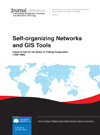GIS Histórico (GIS, Trade, Commercial Networks) coordinado por Ana Crespo (IH-CCHS)
La presente colección de ensayos es el resultado de los primeros años de investigación llevado a cabo por los científicos que componen el equipo de trabajo DynCoopNet (Dynamic Cooperation Networks). Dentro del marco del Programa EUROCORES y en la convocatoria TECT – “The evolution of Cooperation and Trading” de la European Science Foundation, este fue uno de los cinco proyectos aprobados por este ambicioso programa científico interdisciplinario de la Unión Europea. El objetivo del programa fue el estudio de los procesos evolutivos de cooperación e intercambio que se producen tanto en la naturaleza como en las sociedades humanas. El proyecto tiene como valor añadido el logro de diseñar un modelo de datos orientado a un SIG histórico en el cual es posible verter la ingente cantidad de datos históricos con objeto de visualizar, analizar y modelar nuevos planteamientos y nuevas hipótesis sobre la trascendencia histórica de los siglos de la expansión en la Edad moderna (siglos XVI-XVIII). Este programa se basa en una serie de ideas comunes con otras disciplinas. El fenómeno de la cooperación tiene esencialmente, en los diferentes niveles de organización, las mismas raíces y razón de ser en todos los procesos evolutivos ya sean genéticos o histórico-culturales. Los científicos saben que estos procesos surgen en distintos contextos sociales o ecosistemas, desde las bacterias a las sociedades humanas interviniendo en la interacción de los agentes.
Sin embargo, en la mayoría de los casos, la ciencia aún no puede determinar y definir la cooperación y la razón por la cual se lleva a cabo, a pesar de algunos importantes trabajos existentes en varios campos disciplinares como la Economía, la Biología o la Sociología. Se puede decir, en la práctica, que no hay una teoría común que explica la evolución biológica y cultural. Esta teoría pone de relieve las características de las interacciones entre los agentes o entidades que se han desarrollado aún más en relación con el comportamiento económico dentro de las Ciencias Sociales y Humanas. Este trabajo es un estudio realmente interdisciplinar, llevado a cabo por historiadores, matemáticos, cartógrafos e ingenieros de SIG de España, Estados Unidos, Portugal, Alemania, Holanda, India, Suecia, Mozambique y otros países, sobre la evolución histórica del comportamiento de los agentes sociales y el surgimiento de los mecanismos de cooperación en el marco cronológico de la llamada Primera Edad Global (1400-1800). Partiendo de importantes hipótesis sobre la evolución histórica de estos mecanismos de cooperación, extraídos de diversos campos, desde la Neurociencia (es especial en lo que respecta a la teoría cognitiva) a la historia económica (teoría de juegos), los estudios se han centrado en cómo la cooperación era importante dentro de la auto-organización de las redes en la llamada Primera Edad Mundial (1400-1800) y su análisis y visualización en Sistemas de Información Geográfica (SIG)
Crespo Solana, Ana (IH-CCHS, CSIC) & David Alonso García, coords,. Self-organizing Networks and GIS Tools Cases of Use for the Study of Trading Cooperation (1400-1800) Journal of Knowledge Management, Economic and Information Technology, Special Issue, June 2012.
The collected essays comprised in this work are the result of the first years of research by the scientists who make up the DynCoopNet work team. In the framework of the EUROCORES Programme as part of the TECT call – The Evolution of Cooperation and Trading – of the European Science Foundation, this was one of five projects approved by this ambitious, interdisciplinary scientific programme. The aim of this programme has been the study of the emergence of and evolutionary processes of exchange and cooperation that occur in nature, including human societies. This programme was based on a series of common ideas. The phenomenon of cooperation essentially has, at various organisational levels, the same roots and raison d’être in all evolutionary processes whether genetic or historic-cultural. Scientists know that these processes emerge in various social contexts or ecosystems, where bacteria or human societies in multinational alliances have been elements involved. However, in most cases, Science is still unable to determine and define cooperation and why it takes place. Despite a relative lack of research, the study of cooperation has had numerous, convergent developments in various fields, such as Economics, Biology and Sociology. It can be said, in practice, that there is a common theory which explains biological and cultural evolution. This theory highlights features of interactions between agents or entities, which have developed even more in relation to economic behaviour than Social and Human Sciences. In this case, our project has been greatly enriched by an excellent bibliographical base. Generally speaking, theories relating to the emergence of cooperation mechanisms have been applied in various fields, from Neuroscience (especially with regards to Cognitive Theory) to Economic History (Game Theory).
Within this broad research framework, “Dynamic Cooperation Networks” is an interdisciplinary project with historians, mathematicians, cartographers and GIS engineers from the USA, Portugal, Spain, Germany, the Netherlands, India, Sweden, Mozambique and other countries. This collaborative research team has focused on how cooperation was significant within self-organising networks in the so-called First Global Age (1400-1800).
The collected essays comprised in this work are the result of the first years of research by the scientists who make up the DynCoopNet work team. In the framework of the EUROCORES Programme as part of the TECT call – The Evolution of Cooperation and Trading – of the European Science Foundation, this was one of five projects approved by this ambitious, interdisciplinary scientific programme. The aim of this programme has been the study of the emergence of and evolutionary processes of exchange and cooperation that occur in nature, including human societies. This programme was based on a series of common ideas. The phenomenon of cooperation essentially has, at various organisational levels, the same roots and raison d’être in all evolutionary processes whether genetic or historic-cultural. Scientists know that these processes emerge in various social contexts or ecosystems, where bacteria or human societies in multinational alliances have been elements involved.
However, in most cases, Science is still unable to determine and define cooperation and why it takes place. Despite a relative lack of research, the study of cooperation has had numerous, convergent developments in various fields, such as Economics, Biology and Sociology. It can be said, in practice, that there is a common theory which explains biological and cultural evolution. This theory highlights features of interactions between agents or entities, which have developed even more in relation to economic behaviour than Social and Human Sciences. In this case, our project has been greatly enriched by an excellent bibliographical base. Generally speaking, theories relating to the emergence of cooperation mechanisms have been applied in various fields, from Neuroscience (especially with regards to Cognitive Theory) to Economic History (Game Theory).
Within this broad research framework, “Dynamic Cooperation Networks” is an interdisciplinary project with historians, mathematicians, cartographers and GIS engineers from the USA, Portugal, Spain, Germany, the Netherlands, India, Sweden, Mozambique and other countries. This collaborative research team has focused on how cooperation was significant within self-organising networks in the so-called First Global Age (1400-1800).
Crespo Solana, Ana (IH-CCHS, CSIC) & David Alonso García, coords,. Self-organizing Networks and GIS Tools Cases of Use for the Study of Trading Cooperation (1400-1800) Journal of Knowledge Management, Economic and Information Technology, Special Issue, June 2012.
The collected essays comprised in this work are the result of the first years of research by the scientists who make up the DynCoopNet work team. In the framework of the EUROCORES Programme as part of the TECT call – The Evolution of Cooperation and Trading – of the European Science Foundation, this was one of five projects approved by this ambitious, interdisciplinary scientific programme. The aim of this programme has been the study of the emergence of and evolutionary processes of exchange and cooperation that occur in nature, including human societies. This programme was based on a series of common ideas. The phenomenon of cooperation essentially has, at various organisational levels, the same roots and raison d’être in all evolutionary processes whether genetic or historic-cultural. Scientists know that these processes emerge in various social contexts or ecosystems, where bacteria or human societies in multinational alliances have been elements involved. However, in most cases, Science is still unable to determine and define cooperation and why it takes place. Despite a relative lack of research, the study of cooperation has had numerous, convergent developments in various fields, such as Economics, Biology and Sociology. It can be said, in practice, that there is a common theory which explains biological and cultural evolution. This theory highlights features of interactions between agents or entities, which have developed even more in relation to economic behaviour than Social and Human Sciences. In this case, our project has been greatly enriched by an excellent bibliographical base. Generally speaking, theories relating to the emergence of cooperation mechanisms have been applied in various fields, from Neuroscience (especially with regards to Cognitive Theory) to Economic History (Game Theory).
Within this broad research framework, “Dynamic Cooperation Networks” is an interdisciplinary project with historians, mathematicians, cartographers and GIS engineers from the USA, Portugal, Spain, Germany, the Netherlands, India, Sweden, Mozambique and other countries. This collaborative research team has focused on how cooperation was significant within self-organising networks in the so-called First Global Age (1400-1800).

De imperios y colonias: sociedades y culturas atlánticas (*)


